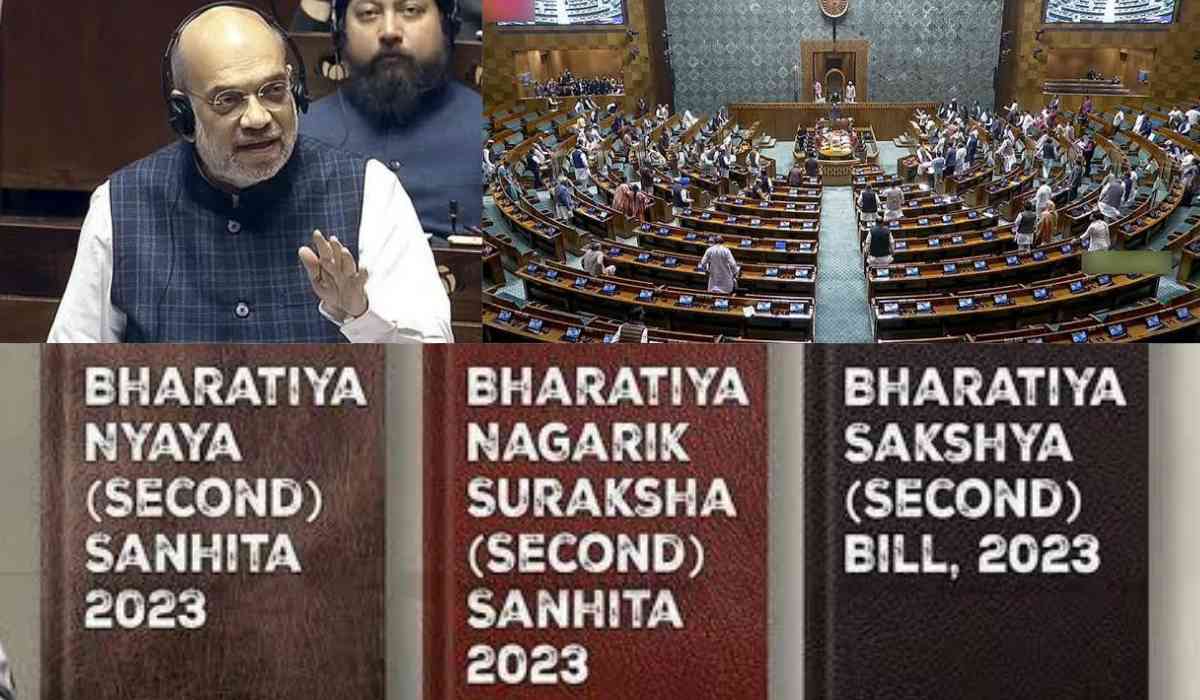Rajya Sabha on Thursday approved three criminal bills; The Bharatiya Nyaya (Second) Sanhita Bill (BNSS) replacing the Indian Penal Code, 1860. The Bharatiya Sakshya (Second) Bill (BSS) replacing the Indian Evidence Act, 1872, and the Bharatiya Nagarik Suraksha (Second) Sanhita Bill (BNSSS) replacing the Code of Criminal Procedure, 1898
The Bills were passed by Lok Sabha on December 20, through a voice vote, with a notable absence of the majority of Opposition members from the INDIA bloc parties, as 97 of them were suspended during this session.
Prime Minister Modi praised the passage of the bills, "The passage of Bharatiya Nagarik Suraksha Sanhita, 2023, Bharatiya Nyaya Sanhita, 2023, and Bharatiya Sakshya Adhiniyam, 2023 is a watershed moment in our history. These Bills signify the conclusion of colonial-era laws, ushering in a new era with laws centred on public service and welfare."
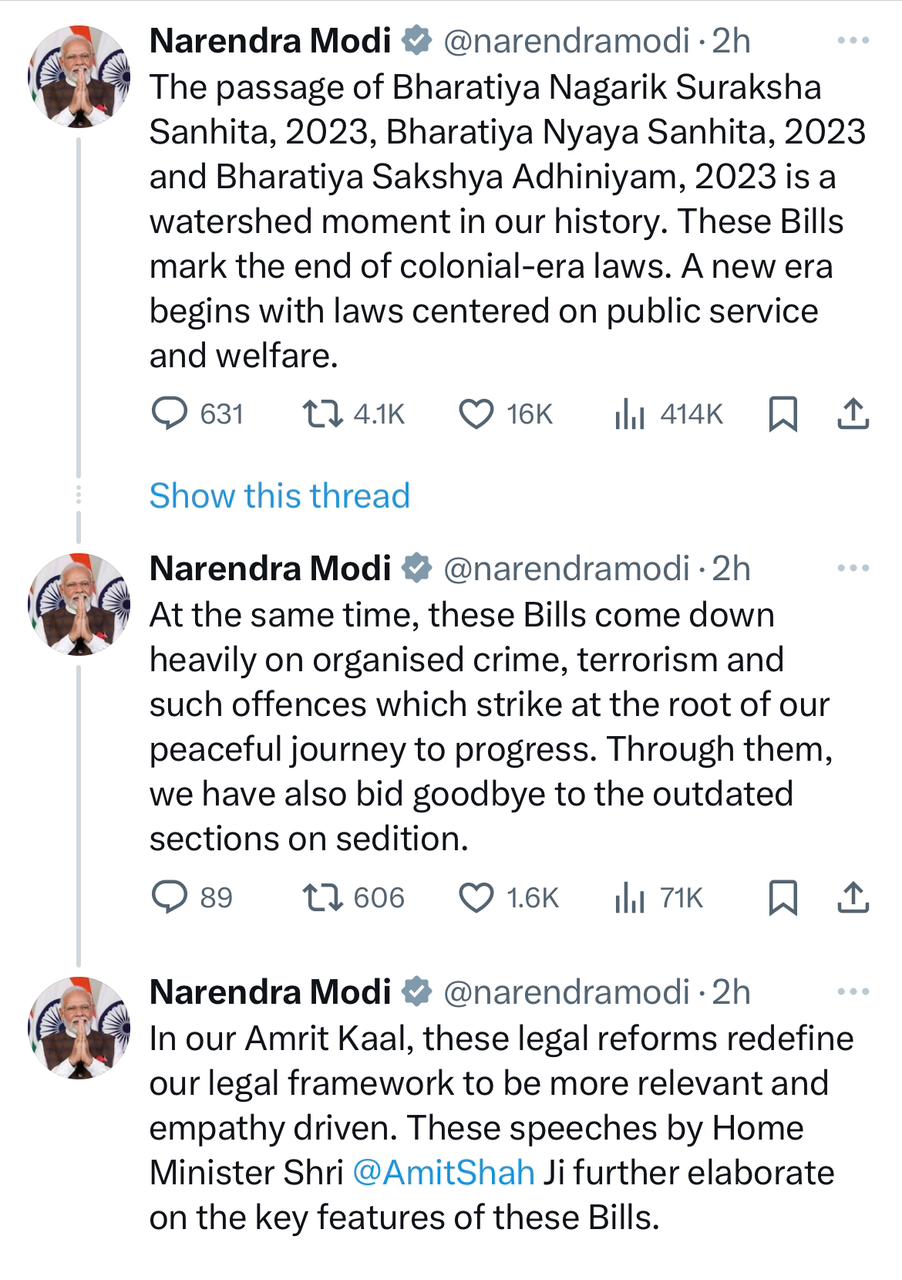
"This is historic. These three bills passed unanimously," remarked Rajya Sabha Chairman Jagdeep Dhankar.
On Wednesday, Union Home Minister Amit Shah expressed the government's vision for a criminal code focused on "justice" rather than "punishment", a transition toward a more humane approach. He added that the three bills are set to replace a range of British-era laws following a day-long discussion in the Lower House.
The Three Significant Bills
The bills, first introduced in Parliament on August 11, underwent scrutiny by a parliamentary standing committee. Taking into account certain recommendations from the panel, a new set of bills, referred to as the "second," were officially presented on December 12.
- The Bharatiya Nyaya (Second) Sanhita, replacing the Indian Penal Code, will now consist of 358 sections, down from 511 in the IPC. The revised code includes increased penalties and mandatory minimum sentences for various offenses. Major changes involve redefining "child" and incorporating transgender in the gender definition. Sedition is replaced with treason, and crimes against women and children are accorded higher priority.
- The Bharatiya Nagarik Suraksha (Second) Sanhita, 2023, has replaced the Code of Criminal Procedure and now comprises 531 sections. Notably, it introduces the provision of Zero FIR nationwide.
- The Bharatiya Sakshya (Second) Bill of 2023 has replaced the Indian Evidence Act, featuring 170 sections. An important update is the expansion of the definition of documents to include electronic records.
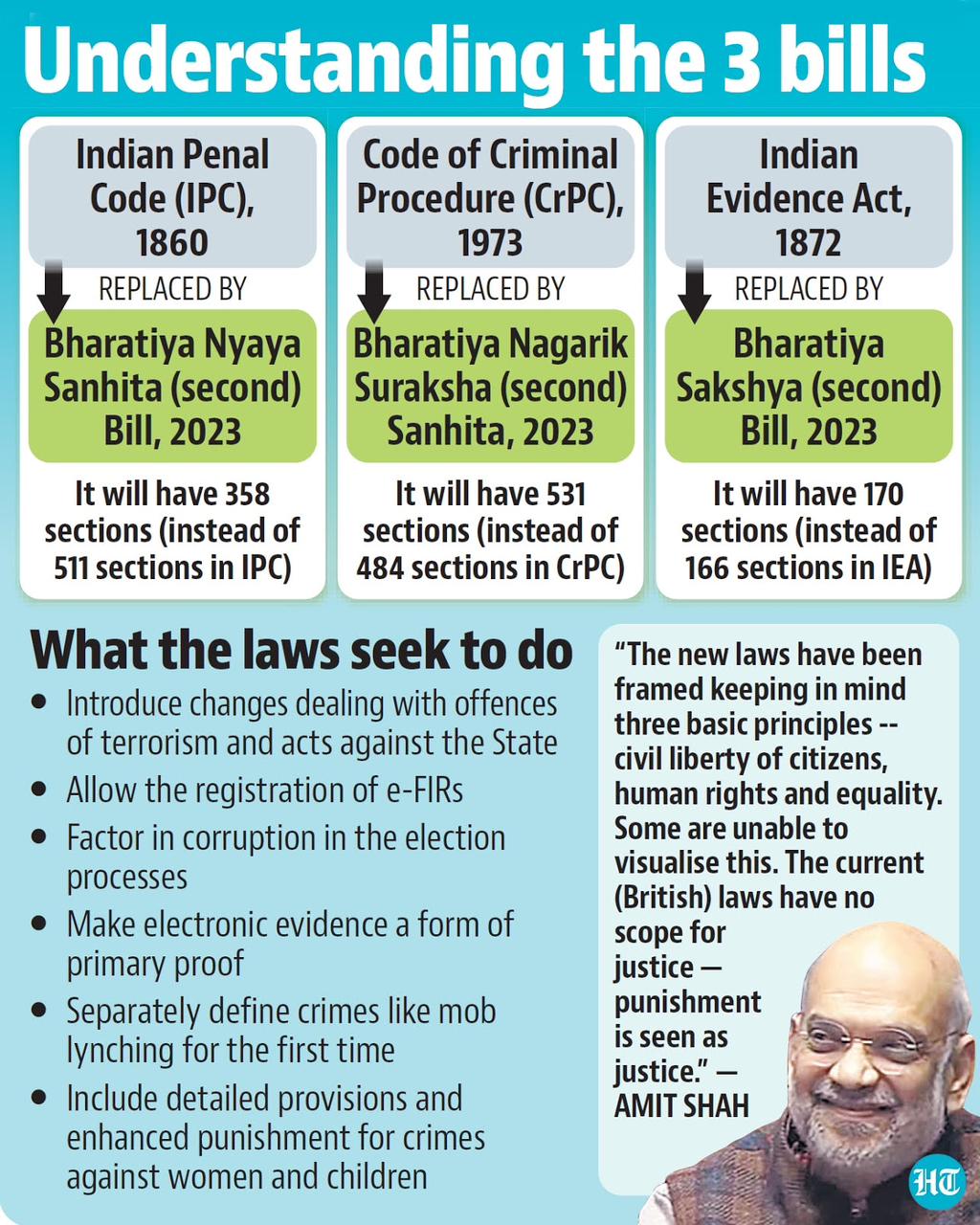
Photo: Hindustan times
Major Changes
- The laws, for the first time, defined ‘terrorism’ and incorporated it as a distinct category in the general crime law.
- Highlight the digitalization of public services.
- Provision of Life imprisonment and the death penalty for raping a woman under 18, transforming sedition into treason, and implementing measures against mob lynching.
- Address issues such as rape, gangrape, crimes against children, and human trafficking.
- Permits reduced punishment in culpable homicide cases when the accused promptly reports the incident to the police and ensures the victim receives medical treatment.
- Hit and run cases will now incur a penalty of 10 years of imprisonment.
- Enhances efficiency in legal procedures, FIRs must be registered within three days, and specific time limits are established for charge sheets, investigations, and court decisions.
- Technology is utilized to prevent the misuse of police powers, including compulsory video recording of evidence.
- Emphasis on transparency, accountability, and safeguarding the rights of both victims and accused individuals.
- Zero FIRs can now be filed at any police station, with a mandatory transfer to the relevant station within 24 hours.
- The legislation also provides clarity on bail and bond provisions, addresses proclaimed offenders and fugitives, introduces trial in absentia, and includes provisions for under-trial prisoners while rationalizing sentence remission.
- They address corruption in election processes, establish electronic evidence as a primary form of proof.
- These bills also impose time limits for specific processes, requiring charge sheets to be filed within 90 days (with a maximum 90-day extension on agency request) and mandating a magistrate to take cognizance within 14 days.
- Decriminalises allegations of medical negligence against doctors.
Union Minister Amit Shah on the 3 Criminal Code Bills
Home Minister Amit Shah stated during his 97-minute reply to the discussions, "The objective of the IPC (Indian Penal Code) was to punish and not deliver justice. All the three laws, which are over 150 years old, were made by the British to rule over us. Prime Minister Narendra Modi decided to remove all such remnants of the colonial era."
Home Minister Shah emphasized, "This is a pure Indian law after removing all the British imprints. As long as we are in power, we cannot become a police state."
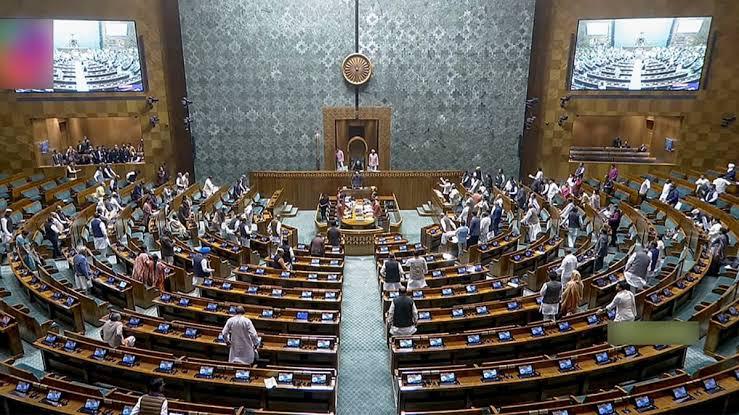
Referring to PM Modi's address from the Red Fort, Amit Shah emphasized, "From the Red Fort, PM Modi had said that we need to free ourselves from the colonial laws. The new laws have been framed keeping in mind three basic principles — civil liberty of citizens, human rights, and equality. Some are unable to visualize this. The current laws have no scope for justice — punishment is seen as justice."
Shah emphasized that the passage of the bill would establish a uniform justice system throughout the country, ensuring consistent legal procedures from Kashmir to Kanyakumari and from Dwarka to Assam.
Shah addressed concerns about the existing Unlawful Activities Prevention Act (UAPA), stating that despite its existence, those in power previously did not invoke it consistently. He emphasized the closure of escape routes for terrorists by including terrorism in criminal law, asserting that such individuals deserve the harshest punishment.
He dismissed fears of misuse in the terror provisions of the BNSS, attributing opposition from some MPs to undue apprehension. He insisted that this fear should persist, with no sympathy for those involved in terrorist acts, emphasising that the current context is not akin to Congress or British rule.
Non BJP member's concerns
During the discussion, non-Bharatiya Janata Party (BJP) MPs, including Harsimrat Kaur Badal of the Shiromani Akali Dal and Asaduddin Owaisi of the AIMIM, raised concerns about the new law providing unrestricted powers to the police.
AIMIM Owaisi expressed concern that the new laws would disproportionately impact minority and underprivileged communities, lacking safeguards against police excess and fabricated evidence. Highlighting the demographic composition of undertrial prisoners, he pointed out that Adivasis, Dalits, and Muslims are disproportionately affected.
The Shiromani Akali Dal (SAD) leader, Harsimrat Kaur Badal, raised concerns about the absence of a majority of the Opposition members, emphasizing that key Bills should not be passed in such a manner and concerns about police allegiance to politicians, urging the Home Minister to understand the potential misuse of these laws. Expressing concerns, Badal stated, "We cannot come up with draconian laws. We cannot become an authoritarian society when we are competing with developed countries." She also expressed worry about the extended time for police custody under the new laws and focused on the human rights angle. Badal questioned the provision limiting mercy petitions to family members, considering scenarios where individuals may not have family to apply on their behalf.
Rajya Sabha member Abhishek Singhvi of the Congress pointed out that the new criminal codes create two sets of anti-terror laws, coexisting with the existing UAPA. He highlighted that the codes grant deputy SP-level officers discretion to choose which anti-terror laws apply in a case, lacking guidelines or criteria for making such a selection. Singhvi indicated that these clauses may be challenged by the Opposition in the Supreme Court.
Amit Shah’s reply to opposition
In response to concerns raised by members, Amit Shah acknowledged, "Some of the members have raised concerns about some of the provisions of the laws which will be alleviated by me. But there are some members like Owaisi ji whose concerns are different and are bigger than the laws in question, and their concerns should be left to linger. Moreover, I have no solutions to their concerns."
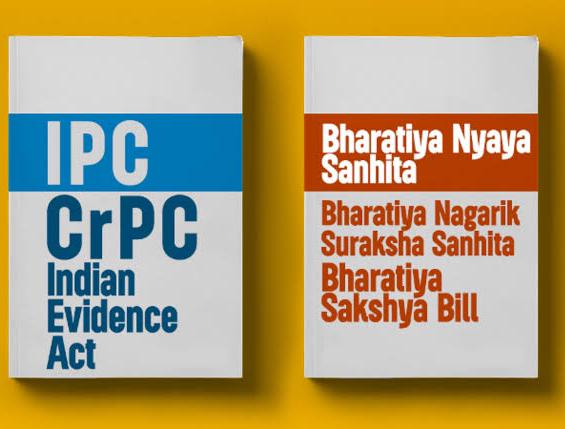
Photo: Live Law
The Home Minister highlighted that sedition has been removed in the new law, stating, "We have replaced an individual with the country. Rajdroha (sedition or offence against the government) has been replaced with deshdroha (offence against the nation or country)." He noted that historical figures like Gandhi, Tilak, and Patel faced imprisonment under this British law, yet it was not revoked by the Opposition during their time in power.
Shah Added “[AIMIM MP Asaduddin] Owaisi ji is thinking that we have merely changed the name of sedition. I want to say that this is an independent country. Nobody will be sent to jail for criticising the government, but you cannot say anything against the country or do anything against the interests of the country. If you harm the flag or the property of the country, you will be sent to jail.”
During the discussions, the Home Minister denied concerns that the new laws would grant police unfettered powers, "At every police station, there will be an officer whose job will be to inform and give details to the relatives of the people arrested. Police will also have to provide an investigation update to the relatives within 90 days."
©️ Copyright 2023. All Rights Reserved Powered by Vygr Media.

